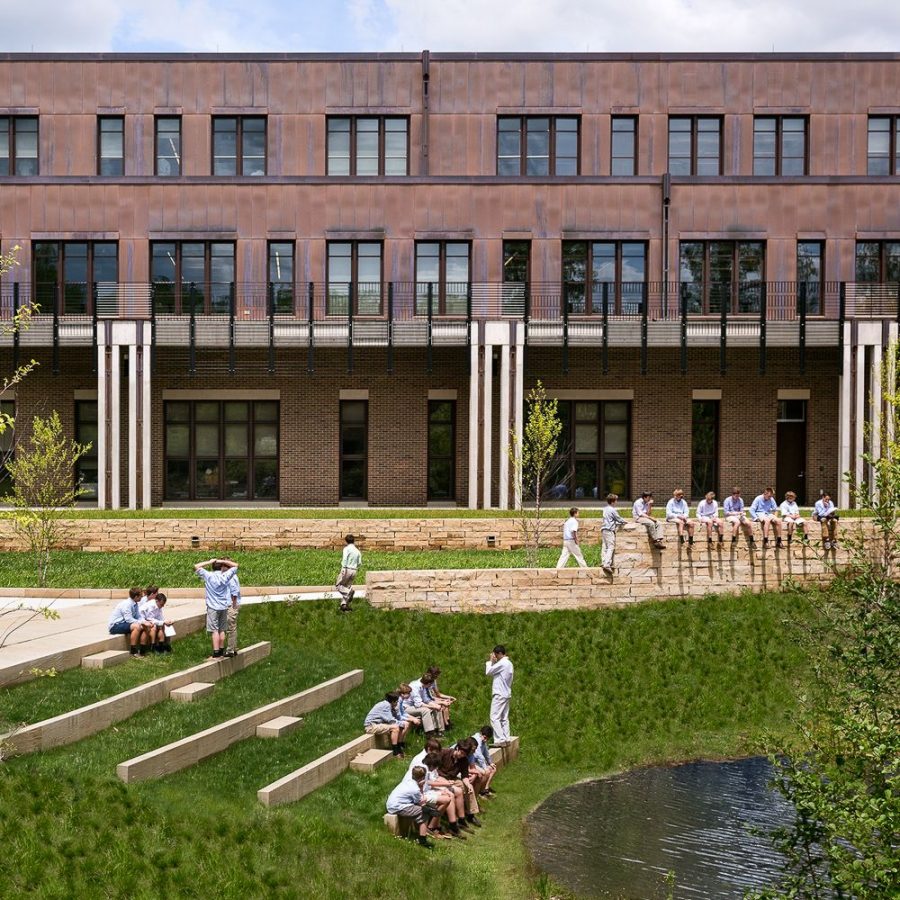Politics on the Homefront: The University School “Political Survey”
University School New Wing, Location: Hunting Valley OH, Architect: Centerbrook Architects and Planners
February 21, 2020
All-male, upper class, overwhelmingly Caucasian: a stereotype the Preppers have dealt with since the conception of University School in 1890. With this stereotype comes the prevailing notion that US predominantly is conservative and republican. By virtue of this survey, I set out to clear that misconception.
Before Thanksgiving, I asked the English department to give a short three-question survey covering US’s opinions regarding 2020 election candidates, political affiliations, and important issues. I received 126 total completed surveys, representing approximately a third of the entire student body, a sizeable and representative sample (thanks Dr. Dykes!). For those who did not take it, the survey asked the recipient to choose from a list of 5 democratic candidates and 4 Republican candidates that they would vote for if they could vote in the primaries, their political affiliation if any, and whether the recipient agreed with a particular stance, or in the case they didn’t, which stance would their candidate agree with the most. Disclaimer: This is a sampling of the US community, and there were joke answers.
In the survey, incumbent President Donald Trump won the popular vote with 29%, followed by Joe Biden with 21%, Bernie Sanders with 16%, Pete Buttigieg with 15%, Elizabeth Warren with 4%, Mark Sanford with 3%, Kamala Harris, Andrew Yang, Vermin Supreme, Michael Bloomberg with 2% each, Ben Shapiro, Mr. Passov, Kanye West, Elon Musk, Joe Walsh with 1% each, and William Weld with 0%.
In terms of parties at US, 34% identified as Republicans, 34% identified as Democrats, 26% identified with no party or were independent, 6% identified as Libertarian, 1% identified as Green Party, and 1% identified as Socialist/CPUSA.
In terms of issues, I noticed that most, if not all, of respondents didn’t actually choose issues their candidate believed in. Rather, they chose issues important to them. 23% of US students said that they believed in corporate tax cuts, 14% believed in criminal justice reform, 13% believed in universal Pre-K and debt-free college, 12% believed in an anti-Trump presidency, 10% believed in embracing globalism, 8% believed in a wealth tax, 8% believed that a leader should not “praise despotic leaders, insult democratic allies, unravel arms control agreements, and rail against the rule of law,” 7% believe in a redefinition in being a Republican, and 3% believed in a $15 minimum wage, estate tax, and a reduction in the size of banks.
For those of you who may not know, globalism is the liberal ideology that embraces a ‘world view’ and encourages citizens to think about their actions and interactions in a global perspective. An example of a product of globalism is the United Nations, an international governing council consisting of nations from around the world. Essentially, globalism boils down to nations planning their economic and foreign policy with making a positive impact upon other nations, in addition to their own, increasing the interconnectedness of nations.
In this report, so far, only surface-level analysis was performed. Upon delving deeper, oddities appear, consistent with the national climate. For instance, 11 US Republicans voted for a Democrat, but no Democrats voted outside party. Thus, it follows that Republicans deviated more from the platform of their party platform rather than Democrats. Among issues pertinent to University School Republicans, 14% believed in criminal justice reform, 7% believed in globalism, 7% believed in universal Pre-K and debt-free college, 14% believed in a redefinition in being a Republican, 2% believed that a leader should not “praise despotic leaders, insult democratic allies, unravel arms control agreements, and rail against the rule of law,” 2% believed in an anti-Trump presidency, and 54% believed in corporate tax cuts. However, across all parties, stance chosen generally matched party platform, with Democrats sticking to their platform more than Republicans. Among issues pertinent to University School Democrats, 14% believed in criminal justice reform, 7% believed in corporate tax cuts, 7% believed in globalism, 18% believed in universal pre-k and debt-free college, 2% believed in a redefinition in being a Republican, 7% believed that a leader should not “praise despotic leaders, insult democratic allies, unravel arms control agreements, and rail against the rule of law,” 14% believed in a $15 minimum wage, estate tax, and a reduction in the size of banks, and 18% believed in an anti-Trump president. This divide among issues, Republicans leaning with democratic policies and Democrats being split nearly evenly among issues is present in the national climate. While outsiders view US as a homogenous group of students with a similar mindset, this survey disproves that notion.
I thought it would be interesting to view opinions held by US Trump voters. Among Trump voters, 18% believed in criminal justice reform, 3% believed in globalism, 3% believed in universal Pre-K and debt-free college, 3% believed in a redefinition in being a Republican, 3% believed in a $15 minimum wage, estate tax, and a reduction in the size of banks, 70% believed in corporate tax cuts. I was pretty intrigued by the results that only 70% of Trump voters believed in a traditionally Republican platform, with the other 30% believing in a Democratic platform. The implications of this are yet to be seen.
Still, in ten months, the newest generation, the seniors of US and all eligible 18 year-olds, will head to the polls, and possibly, these survey results could predict the next president, or the masses of Democratic sentiments could manifest itself behind one candidate… Only time can tell.

